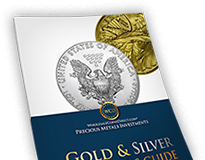- Gold $0.00 $0.00
- Silver $0.00 $0.00
- Platinum $0.00 $0.00
- Palladium $0.00 $0.00
Pricing:
| QUANTITY | E-CHECK/WIRE | CREDIT CARD |
|---|---|---|
| Any | $3,411.76 | $3,554.03 |

Get Our Free
Gold & Silver
Investor's
Guide
Description:
For most years of U.S. history, until the withdrawal of gold from circulation in 1933, the country's coinage included the eagle. This type of coin was given a $10 face value and, for almost seven decades, had what history has often referred to as the Liberty Head design. Coins with this look can be considered to form the Liberty Gold Eagle series, which entered production with a Christian Gobrecht-created design in 1838. The series' mintage run wouldn't end until 1907 - but how much changed in the United States in that time?
In 1838, the Democrat Martin Van Buren was in the second year of a short-tenured presidency, Alfred Vail demonstrated Morse code's forerunner, and a young Abraham Lincoln delivered a Springfield Young Men's Lyceum-set speech. Fast-forward to 1907, and Theodore Roosevelt was leading the country, Daniel Tobin started what would become a 45-year presidency of the International Brotherhood of Teamsters and the still-standing Hershey park was opened in the Hershey area in Pennsylvania.
Throughout that 69-year period, the design of the coin itself changed remarkably little. It both started and ended with portrayals of a seemingly shield-bearing flying eagle and a coronet-wearing goddess - though there remained minor changes of note.
Those subtle alterations included one to the coronet tip's location. On 1838 and 1839 coins the tip came very close to the sixth - counting clockwise - star of the 13 on the piece. However, on discs dated 1840 or later, it was nearer straight in-between the sixth and seventh of those stars. Furthermore, a scroll with the legend "IN GOD WE TRUST" was made part of the eagle-depicting side of the Liberty Gold Eagle starting in 1866. That was a single year after the American Civil War was wrapped up and the United States triumphed in a battle against the prospect of maintained slavery.
Other clearly-displayed letters on this coin include those of "UNITED STATES OF AMERICA" and "TEN D." at the rear side and, on Liberty's headwear, "LIBERTY" at the other. When a Liberty Gold Eagle's condition reaches at least Mint State 65 standard, such details are easier to appreciate. Mint State 65 is a grade indicating at very particular highlights and imperfections on the piece. An MS65 coin should, for its issue, show a strike reaching average quality at the least. Meanwhile, the luster, while it should surpass the average standard, does not have to be a completely intact mint luster.
An MS65-standard Liberty Gold Eagle is a treasure indeed. Its condition exceeds the issue's average, while the luster and overall appearance will be attractive on the whole. Therefore, should you come to own this kind of coin, you would be positioned well for selling it at a high price. This obviously makes the coin appealing to investors, who the 90 percent gold content could particularly excite. Still, history buffs might also be interested in acquiring piece perhaps with the aim of placing it in a broad numismatic collection intended to be publicly displayed.
Features of the Common Date $10 Liberty Gold Eagle MS65
- Shows "TEN D." face value
- Design that can slightly differ with issue date
- Smaller weight and diameter than Turban Head coins
Orders placed for products that are not a specific year will be fulfilled with coins of any date, based on availability. Orders of multiple coins may be filled with the same year or a variety of years.
Specifications:
| Product Type | Coin |
|---|---|
| Coin Series | Pre-33 Gold |
| Purity | 90% |
| Mint/Refinery | U.S. Mint |
| Metal Type | Gold |
| Face Value | $10 |
| Grade | MS65 |
| Coin Type | Certified |
| Modern or Historical | Pre-33 |
| Grade Service | NGC |
| Year | Varies |
| Metal Weight | 0.4838 troy oz |








